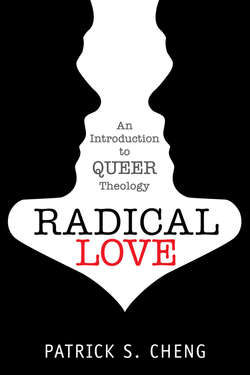Читать книгу Radical Love - Patrick S. Cheng - Страница 17
На сайте Литреса книга снята с продажи.
Queer Scripture
ОглавлениеFirst, queer theology draws upon scripture—that is, the Hebrew and Christian scriptures (also known as the First and Second Testaments)—in creative ways. Although scripture (and, in particular, the handful of “texts of terror”20 for LGBT people) traditionally has been used as a means of oppressing LGBT people, queer biblical scholars in recent years have not only countered these antiqueer readings with alternative readings, but they have also “taken back” or “reclaimed” the Bible by interpreting it positively and constructively from their own perspectives.
For example, take the story of Sodom and Gomorrah in Genesis 19, which has been the paradigmatic story for God’s punishment of same-sex acts. In that story, two angelic visitors stay overnight in the town of Sodom. However, the lawless men of Sodom demand that the visitors’ host, Lot, turn the visitors over so that they may “know” them. The visitors escape along with Lot’s family, and God destroys Sodom and its sister city, Gomorrah, with fire and brimstone.21
Although the story of Sodom and Gomorrah has been interpreted traditionally as evidence of God’s punishment of LGBT people, queer biblical scholars have argued that the story is actually a condemnation of the sin of inhospitality toward strangers, which had life or death consequences in the harsh desert environment of the biblical world. This is evidenced by the descriptions of Sodom and Gomorrah elsewhere in the Bible (for example, Ezekiel 16:48–49), which focus on inhospitality instead of same-sex acts.22
Ironically, some LGBT theologians and ethicists such as Nancy Wilson and Kathy Rudy have “queered” the Sodom narrative by placing hospitality at the center of queer theological reflection. For example, Wilson has constructed a “queer theology of sexuality” by focusing on the gift of “promiscuous” or “bodily hospitality” that many LGBT people have.23 Rudy, an openly lesbian ethicist at Duke University, has suggested that nonmonogamous sex acts—including anonymous and communal sex—can be viewed in terms of a progressive ethic of hospitality.24
Much has been written about the debate over the meaning of the half-dozen or so LBGT “texts of terror” in the Bible, and I will not rehearse those arguments here.25 However, it is important to note that queer theologians have gone beyond these “texts of terror” and have read the Bible in creative and constructive ways as a means of affirming LGBT experience.26 For example, Nancy Wilson has argued that LGBT people can be found in a number of biblical narratives—including David and Jonathan, Ruth and Naomi, the Roman Centurion, the Ethiopian Eunuch, and Mary, Martha, and Lazarus—which she refers to as “our gay and lesbian tribal texts.”27
In 2006, over thirty LGBT religious scholars, ministers, and writers contributed to The Queer Bible Commentary, which was the first queer commentary on all the books of the Hebrew and Christian scriptures, from Genesis to Revelation. As the preface states, the commentary shows that biblical texts have the “ever-surprising capacity to be disruptive, unsettling and unexpectedly but delightfully queer.” Furthermore, the contributors employed a wide range of hermeneutic approaches, including “feminist, queer, deconstructionist, postcolonial, and utopian theories, the social sciences, and historical-critical discourses.”28
Other examples of using scripture as a positive source for queer theology include: Jacob’s Wound: Homoerotic Narrative in the Literature of Ancient Israel; Queer Commentary and the Hebrew Bible; The Subversive Gospel: A New Testament Commentary of Liberation; Take Back the Word: A Queer Reading of the Bible; Torah Queeries: Weekly Commentaries on the Hebrew Bible; When Deborah Met Jael: Lesbian Biblical Hermeneutics; and The Word Is Out: Daily Reflections on the Bible for Lesbians and Gay Men.29 By engaging with scripture from our unique social locations, queer people are able to articulate more clearly how the Word of God has touched us, and how we in turn can “talk about God” from an authentically queer perspective.
